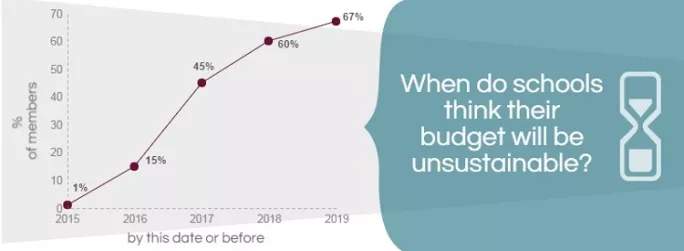Two-thirds of schools ‘struggling to make ends meet’

Almost two-thirds of school leaders are being forced to make significant cuts or dip into their reserves to balance their budgets, new research shows.
Four in five school leaders (82 per cent) said their current budget would have a negative impact on standards in schools, according to a survey from headteachers’ union NAHT.
It also reveals that many schools are being forced to reduce investment in equipment (64 per cent), cut back on essential maintenance (50 per cent) and shrink the number or hours of teaching assistants (49 per cent) to stave off budget deficits.
The school funding survey, of more than 1,000 leaders, shows that 7 per cent of schools have already reached a deficit, while 64 per cent have only avoided it by making cuts or carrying over a surplus.
More than half (53 per cent) of the school leaders who had a surplus budget said it was because they were planning for a deficit in coming years. Stuart Beck, senior leader for finance at Sacred Heart of Mary Girls’ School in Havering, told TES that the academy had a surplus of around £620,000 in September 2014 to prepare for tighter budgets. But this year it will have to use up all the reserves.
“Having thought that we had built up a cushion, we are still going to have to make cuts,” he said. “To meet all the requirements, we could be potentially facing a deficit between £500,000 and £600,000 for 2016-17. That is the cost of around 12 teachers.”

The figures show that nearly half (45 per cent) of school leaders thought their budget would be untenable on current projections within two years. Cathy Rowland, headteacher at Dobcroft Infant School in Sheffield, told TES that she was “surprised” that the figures were not higher.
She said: “We have lost a day of senior management time and have had to cut teaching assistant support. It means everyone has to do a lot more. Next year I am probably going to go in with a deficit and make further cuts, but I don’t know where I will find these cuts. There is no easy option left.”
Russell Hobby, general secretary of the NAHT, said: “Flat cash education spending at a time of rising costs is pushing many schools closer to breaking point. Employer costs for national insurance and teachers’ pensions will increase by over 5 per cent from this school year, adding to already over-stretched budgets.
“The money coming into schools is not keeping up with the expenditure they face. As the IFS [Institute for Fiscal Studies] pointed out recently, the government’s funding commitment equates to the first real terms cut in education spending since the 1990s.”
The “Breaking Point” report from the NAHT recommends:
- That the government should match the overall level of funding to the real cost pressures in schools - including meeting the shortfalls in funding for early years, sixth forms and for services previously provided by local authorities
- A period of funding stability which would help in managing costs and improving performance
- A fair national funding formula to ensure that limited funds go where they are most needed
- Children eligible for the Pupil Premium be registered automatically, rather than forcing schools to discover their eligibility
- Investment in the further development of school business managers
A DfE spokesperson said: “We are protecting the schools budget, which will rise as pupil numbers increase. This government is committed to making sure schools are funded fairly so all pupils have access to a good education - a key part of our core mission to raise standards across the country and make sure every child reaches their full potential.
“We have made significant progress towards fairer funding for schools, through an additional £390 million allocated to 69 of the least fairly funded areas in the country - the biggest step toward fairer schools funding in 10 years.”
Want to keep up with the latest education news and opinion? Follow TES on Twitter and like TES on Facebook
Keep reading for just £1 per month
You've reached your limit of free articles this month. Subscribe for £1 per month for three months and get:
- Unlimited access to all Tes magazine content
- Exclusive subscriber-only stories
- Award-winning email newsletters



